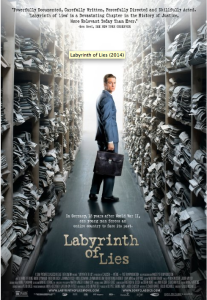Labyrinth of Lies
LABYRINTH OF LIES -sp
To us, one of the most important and memorable aspects of this outstanding film is that the current generation of German filmmakers and the people related to this industry, have decided to make this movie the 2015 entry from Germany to the Oscars for best foreign film. Doing this also reflects the monumental theme of this movie, which is the responsibility of the German people for Auschwitz and the Holocaust.
The story is based on actual events and follows a young German prosecutor (Alexander Fehling) in Frankfurt, Germany in the early 1960s as he becomes aware that identifiable people now living in Germany were responsible for murder in the Auschwitz Camp during World War II. Although the Nuremberg trials, which occurred shortly after World War II nearly 20 years previously, were monumental in the prosecution of members of the political, military, and economic leadership of Nazi Germany who participated in the Holocaust and other war crimes, those trials were carried out by the victorious allies. In the film, which depicts a true story, we see, probably for the first time ever, a government trying to prosecute its own former soldiers. The question of who was guilty and was there any family spared having a war criminal among them is raised. As one of the characters states, the only innocent people were those who weren’t born yet or who were small children when all these events happened.
It matters very little that the main focus is on Johann Radmann who is the prosecutor played magnificently by Alexander Fehling, who was in reality a composite of three prosecutors in real life. All the characters in the movie are true to life and very believable. One of them, Fritz Bauer, played by the famous German actor, Gert Voss, has a famous legal institute now named in his honor. One of the buildings where the archival records were being searched in the film is the actual location of where the well kept records of the Nazi regime are now stored for historical examination.
Director/writer Giulio Ricciarelli has been very thoughtful in his choices, so as not to make the movie a recapitulation or a reenactment of the horrors of the Holocaust. Rather, he puts the focus on the impact on the people living in post-war Germany. One interesting point that was made very clear was that most of the German people at the time, depicted in the film, did not know about Auschwitz nor did they want to know about it.
We were reminded that our recent personal observations have shown that most contemporary Germans no longer deny their history. This was very clear to us in our recent visit to Berlin, where we saw the names of displaced Jews embedded in plaques on the sidewalks in front of their former houses. We also visited the very complete and well-done Holocaust museum as well as many other points of remembrance. This film clearly created an honest reflection of German history, which was not known to most of us. It was a powerful and beautifully done work of fact, emotion and importance. (2015)
Category: 5 Stars, Drama, Foreign, History, Uncategorized | Tags: 2015, Alexander Fehling, Auschwitz, Frankfort Trials, Fritz Bauer, Geermany, German, Gert Voss, Giulio Ricciarelli, holocaust, Johann Radmann, Labyrinth of Lies, Nuremberg Trials Comment »




